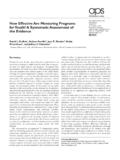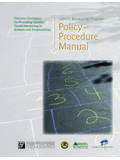Transcription of BA Competency Framework - Core Consulting Group
1 Business Analysis Competency Framework Version Dated 14th February 2011 Authors: Brenda Treasure Martin Vaughan Note: This document has been prepared by the authors for publication on the Australian Business Analysis Association (ABAA) web site for public use. People and organisations should make their own assessment of the proposed Framework against their needs prior to modifying or using it. Neither the ABAA or the authors will accept any liability whatsoever for it s use. Core Consulting Group BA Competency Framework Page 2 of 20 1 Introduction .. 2 2 Background .. 3 3 Discussion and research .. 4 What is a Business Analyst? .. 4 What makes a good Business Analyst ? .. 4 Research .. 5 Why do we need competencies? .. 7 What can be learnt from the Project Management profession? .. 7 Consulting considerations .. 7 Trusted advisor .. 8 4 Business Analysis Competency Framework .
2 9 Framework Summary .. 9 Business Analysis 10 Personal Effectiveness Framework .. 14 Administration Framework .. 18 Document history Version Issue Date Author Nature of Amendment (Details) 9/9/08 M. Vaughan & B. Treasure First draft 17/9/08 M. Vaughan Reworked after review with Brenda Treasure 23/10/08 M. Vaughan Reworked after review with Andrew Major 14/02/11 AS Updated header Core Consulting Group BA Competency Framework Page 3 of 20 1 Introduction This document will give you an outline of the skills and competencies of an effective Business Analyst and why Competency levels and assessments are important to any organisation. With Business Analysis Competency assessments, we can determine who has the best mix of traits and skills to be an effective Business Analyst, or the potential to become one. Competency assessments also help us identify candidates skill area strengths and weaknesses.
3 As a result: Business Analysts can be appropriately recruited. Business Analyst training and development programs should be more effective. Projects should be defined at a higher quality level. Hence more projects will be successful Hence profitability should improve. 2 Background Today's project environment is dynamic, fast-paced and enormously complex. The need for new products and services requires companies to have execution capability that is fast, reliable and of high quality. This is driving organisations to better define the scope and feasibility of projects in order to focus them on projects which deliver business benefit while terminating or holding over projects which do not. Projects which are funded and approved benefit enormously from clearly defined objectives, benefits and requirements. A consistent theme in the project management community is the need for clearly defined requirements and robust business cases in order to ensure project success.
4 It is broadly accepted that improvement in definition and analysis of projects will directly correlate with project success rates and are among the most important critical success factors (Ref Levine 2004, Sommer 2004). Unlike Project Management, the profession of Business Analysis has only recently been defined and professional associations are just starting to emerge. Both professional associations with presence in Australia are only now beginning to define competencies, assessment and accreditation. Meanwhile organisations grapple with defining Business Analysis competencies without the accepted frameworks taken for granted within the Project Management community. The following model is proposed based on the author s contribution to the Australian Business Analysis Association in defining the Business Analysis Framework along with research into what the International Institute of Business Analysis is proposing in their BABOK, draft version It blends their ideas together with the author s experience having line managed groups of Business Analysts in the past.
5 Core Consulting Group BA Competency Framework Page 4 of 20 3 Discussion and research What is a Business Analyst? Unlike Project Management, the Business Analyst role isn t as clearly defined or understood. According to the Australian Business Analysis Association, a Business Analyst is a professional who supports the evolution and implementation of business decisions via the application of specialist analytical tools, techniques and procedures. This would imply a specialist and focuses the person on supporting the needs of the business. Specialisation tends to be around the types of Business Analysis. Some Business Analysts focus on technology, sometimes referred to as Systems Analysts, they tend to focus on matching the business needs to technology outcomes. Other streams of specialisation within the Business Analysis field are Commercial Analysts and Process Analysts. Commercial Analysts focus on the broader organisation, in particular structure, strategy, products and market opportunities.
6 Process Analysts focus on the changes to business processes, particularly the impact on existing staff. The complexity comes with large projects which combine technology and business process change, particularly relating to deployment and staff training. It should also be recognised that many Business Analysts have roles with blurred lines between Business Analysis and Project Management. In early stages of projects some Business Analysts are called upon to drive the project as well as manage stakeholders, scope and plan the project, provide estimating and even status reporting services. It is often useful to consider these as two distinct and separate roles provided by the same individual. Some organisations have confused a subject matter expert as a Business Analyst, eg Billing specialist. Again the roles should be considered quite separate. What makes a good Business Analyst ? Good is in the eye of the beholder so a reasonable starting place is to consider who are a Business Analyst s stakeholders.
7 Typically, these will include: Customers the sponsor Business Unit Product managers, SMEs and technology staff Project Managers Line Managers, specifically the BA s line manager Colleagues and peers Perception of good then will be based on the individual s perspective. Do they do their job well, are customers satisfied, are they high maintenance , are they pleasant to work with ? For the purposes of this document let s consider effective rather than good . Like Project Management we could consider the "art" vs. the "science" approach. The art side requires strong communication, vision, and interpersonal skills; the science side requires detailed knowledge of methodology and tools, plus strong analysis and problem-solving skills. Business Analysts must add to this an understanding of the technology being developed as well as the business impact that the technology and business process change will bring. Core Consulting Group BA Competency Framework Page 5 of 20 Whether viewed from an executive management or team member standpoint, the competencies of an effective Business Analyst fall into five main areas: Their understanding of business and technology Their ability to facilitate, research, model and define requirements Their communication skills with senior management and other project team members Their soft skills in terms of motivation, flexibility, influencing skills, problem solving skills.
8 Their documentation and administrative skills We have grouped these under three headings; Business Analysis, Personal Effectiveness and Administration to align with the Project Management Competency Framework . Research According to the Webster s on line dictionary: Business is defined as A commercial or industrial enterprise and the people who constitute it Analysis is defined as The abstract separation of a whole into its constituent parts for study Competency is defined as The quality of being adequately or well qualified physically and intellectually . Synonyms of Competency from Webster s based on Roget s Thesaurus: Ability; ableness; efficacy; efficiency, productivity, expertise (skill); validity, cogency; enablement; vantage ground; influence Businesses exist usually to provide value to shareholders. Analysis, thinking and synthesis are sometimes aligned, as are competencies and skills. The Australian Business Analysis Association ( ) have published the following context diagram which captures the Competency areas, the personal attributes and the specific specialisation areas within the broader environmental context.
9 Core Consulting Group BA Competency Framework Page 6 of 20 Knowledge ManagementEvaluateFacilitateModelResearc hDecision Document Writing PlanSpecialisationEnvironmentIndividualS kills& CompetenciesExperienceExperienceAstutene ssAstutenessValuesValuesStyleStyleKnowle dgeKnowledgeProcessProcessCommercialComm ercialTechnicalTechnicalOthersOthersTool sToolsTechniquesTechniquesIndustryIndust ryEducation/Education/TrainingTrainingOr ganisational Organisational StrategyStrategyStandardsStandardsCommun ication (the key)CommunicationHistoryHistory According to the International Institute of Business Analysis ( ), who have published their Business Analysis Body of Knowledge version there are seven main knowledge areas. Within each of those areas they have defined the skills at a more detailed level. BABOK Overview diagram reproduced from Version Core Consulting Group BA Competency Framework Page 7 of 20 Why do we need competencies?
10 By defining Business Analysis competencies business will be able to: Better assess candidates during the recruitment process Better define an individual s role and hence assess their performance and improvement against agreed key performance indicators Structure training and mentoring programs around those areas of Competency which an individual is not yet competent and/or an organisation is generally lacking More efficiently predict and structure the resource pool for future projects What can be learnt from the Project Management profession? Competency definition in the Project Management profession has allowed assessment and accreditation of Project Managers and hence established benchmarks within the profession along with career growth opportunities. The PMI's Project Management Competency Framework , version 2 published in 2002, identifies project management knowledge, performance criteria associated with that knowledge and personality traits as a Framework for Competency .








